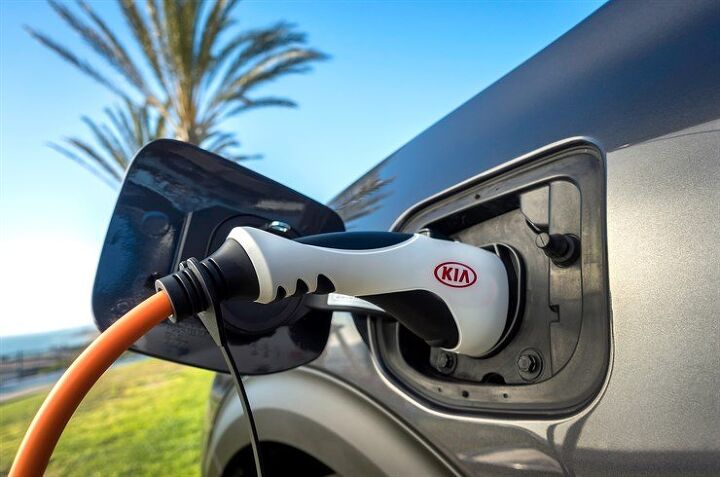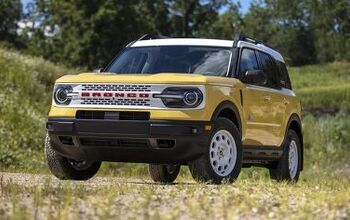Shocking? Many Buyers Aren't Quite Sure What a Hybrid Car Is

The first mass-market hybrid in the Western World, the Honda Insight, debuted while we were still worrying whether Y2K would lead us back into the Stone Age. Some days, I wonder whether we’d be better off if it had.
Regardless of my personal feelings about humanity and societal progression, we’ve had nearly two decades to familiarize ourselves with the gas-electric powertrain, but apparently not everyone got the message. A recent survey of 1,000 drivers shows there’s still plenty of confusion over what a hybrid car is actually capable of.
While the survey, conducted by UK publication Autocar and market research firm Simpson Carpenter LTD., centered around fuel types and driver preferences, it’s the hybrid question that interest this writer.
Let’s go out on a fairly sturdy limb and assume that British drivers have a similar level of access to product information as their North American counterparts. The UK is a wealthy, worldly, connected, technologically advanced nation with a sizeable motoring press and no shortage of cutting edge European car offerings. Frankly, they should know what’s up.
Instead, the survey found that “a third of respondents cited concern over driving range as a reason not to consider buying a hybrid model, despite this only being an issue that affects pure electric vehicles,” Autocar writes.
It’s easy to forget that most drivers do not spend their free time reading about the latest new vehicle in the online pages of whatever. For over a century, gasoline and diesel ruled the roost, and shoehorning a new propulsion type into the conversation means it’s going to take some time before the information sinks in. The thing is, though, everyone knows what an electric car is. These existed over a century ago, only to reappear roughly a decade after the first hybrids hit the market.
Autocar notes that while nearly a quarter of Brits claim they plan to purchase a hybrid or electric vehicle as their next car, only 5.1 percent vehicles sold in the first quarter of 2018 fell under the label of “alternatively fueled vehicles.” That’s a little more than double the take rate in the United States.
“Potential hybrid buyers are confused by the technology and are being deterred by [perceived] barriers,” said Tom Simpson, managing director of Simpson Carpenter.
The technology, at least for a consumer, is not difficult to understand. A hybrid vehicle — depending on type — operates on electric power in some situations, but always has a gas tank and internal combustion engine on board. Maybe it’s the latter part of the description that’s not getting across. And who’s to blame for that? Automakers, their marketing agencies, and the media, mainly, as these are the entities that furnish the public with information.
Calling a hybrid, plug-in or otherwise, an electrified car doesn’t help this confusion, but it does help automakers burnish their green cred. While technically accurate, to the uneducated driver’s ear it sounds too much like electric. So much time and effort goes into touting a hybrid’s (limited) gas-free driving abilities — and avoiding any mention of gasoline or emissions or any of that nasty stuff — that a barely-listening buyer can easily become confused. It’s a communications problem that’s not getting better, either, even as sales of electrified vehicles rise (ever so slowly).
Sure, this is just one survey, but it’s revealing nonetheless. I’d be very interested in seeing an identical one conducted on this side of the pond.
[Images: Honda, Kia Motors]

More by Steph Willems
Latest Car Reviews
Read moreLatest Product Reviews
Read moreRecent Comments
- Kjhkjlhkjhkljh kljhjkhjklhkjh A prelude is a bad idea. There is already Acura with all the weird sport trims. This will not make back it's R&D money.
- Analoggrotto I don't see a red car here, how blazing stupid are you people?
- Redapple2 Love the wheels
- Redapple2 Good luck to them. They used to make great cars. 510. 240Z, Sentra SE-R. Maxima. Frontier.
- Joe65688619 Under Ghosn they went through the same short-term bottom-line thinking that GM did in the 80s/90s, and they have not recovered say, to their heyday in the 50s and 60s in terms of market share and innovation. Poor design decisions (a CVT in their front-wheel drive "4-Door Sports Car", model overlap in a poorly performing segment (they never needed the Altima AND the Maxima...what they needed was one vehicle with different drivetrain, including hybrid, to compete with the Accord/Camry, and decontenting their vehicles: My 2012 QX56 (I know, not a Nissan, but the same holds for the Armada) had power rear windows in the cargo area that could vent, a glass hatch on the back door that could be opened separate from the whole liftgate (in such a tall vehicle, kinda essential if you have it in a garage and want to load the trunk without having to open the garage door to make room for the lift gate), a nice driver's side folding armrest, and a few other quality-of-life details absent from my 2018 QX80. In a competitive market this attention to detai is can be the differentiator that sell cars. Now they are caught in the middle of the market, competing more with Hyundai and Kia and selling discounted vehicles near the same price points, but losing money on them. They invested also invested a lot in niche platforms. The Leaf was one of the first full EVs, but never really evolved. They misjudged the market - luxury EVs are selling, small budget models not so much. Variable compression engines offering little in terms of real-world power or tech, let a lot of complexity that is leading to higher failure rates. Aside from the Z and GT-R (low volume models), not much forced induction (whether your a fan or not, look at what Honda did with the CR-V and Acura RDX - same chassis, slap a turbo on it, make it nicer inside, and now you can sell it as a semi-premium brand with higher markup). That said, I do believe they retain the technical and engineering capability to do far better. About time management realized they need to make smarter investments and understand their markets better.



































Comments
Join the conversation
The only explanation I can think of for hybrids not being on car buyers' minds is inertia or habit. Despite being aware of how suitable my hybrid is, not one of the people I know who has bought a car in the meantime has bought a hybrid. There is no shortage of choice in hybrids. Price differentials on new hybrids have come down to minor or zero compared to equivalent non-hybrids. Used or new. They do indeed get considerably better mileage. The reliability records are excellent. The batteries do not need replacing. I met a couple with a hybrid like mine. I asked them why they opted for a used hybrid. They said they were looking at several used Ford Escapes, and the one they chose because they liked the color and condition, happened to be the only hybrid. They said they didn't care then, but would never again buy a regular gas car. Maybe the key is to just get people to test drive them. A test drive in a Prius is how I "got" that hybrids work and make sense. But pushing test drives of hybrids would require enthusiasm from dealerships and sales staff, and I think that enthusiasm is lacking.
I bought my 25 yo daughter a 2012 Prius as a graduation present last year. She knows little about cars and does not care about driving. She does care about MPG. She has been very happy getting around 50mpg and trouble free this past year. I can't stand driving it myself but she is happy.